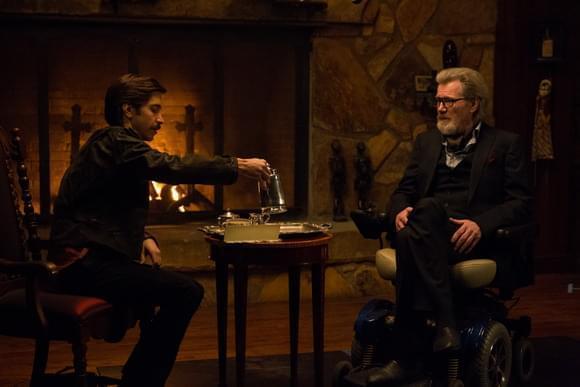Tusk

Director(s): Kevin Smith
Writer(s): Kevin Smith
Cast: Justin Long, Michael Parks, Haley Joel Osment, Genesis Rodriguez, Ralph Garman and Harley Morenstein
Reviewed by: Christine Lambert on
Release Date(s)
Oct 3, 2014 - WideI once showed a short film to Ian Evans that was wrought with blood, gore and sadistic violence. His response was, “Whenever I see work like that, I think about the mind that could come up with it.” I never forgot what Ian said. I started to see art through that lens. We are all coloured by our experiences, perception, and knowledge that ift affects how we act and behave. I also remembered something my English teacher said in high school, “Write what you know.” Both of these apply to Tusk.
Wallace (Justin Long) is the brash podcaster of Not See Party. He and his sidekick Teddy (Haley Joel Osment) routinely ridicule people with their mean-spirited comedy. At this point, their focus is on the Kill Bill Kid, a boy who chopped of his leg while playing with a sword in front of a video camera. The footage of the accident goes viral after the laptop it was on was sold without his knowledge. The new internet sensation agrees to an interview with Wallace. Teddy remains behind with the excuse of being afraid to fly. The solo trip finds Wallace in Canada and, unfortunately, without an interview subject as the day of the interview is also the day of the kid’s funeral. Angry at his misfortune, Wallace is determined not to leave Canada empty-handed. While at a urinal in a bar, he notices a flyer asking for lodgers from a world-travelled man with seafaring tales to tell. Wallace calls Howard Howe (Michael Parks) and immediately sets a time to meet him. It becomes evident that the seemingly delicate and disabled man whose sadistic nature and obsession with a walrus named Mr. Tusk will result in Wallace’s demise.
Tusk is without a doubt one of the most twisted pieces of cinema that I have ever seen. Many aspects of Tusk are based in reality. Writer-director Kevin Smith has a podcast named Smodcast. Minutes before a recording, he was sent a link of an ad that read, “I’ve lived a long and storied life including a period when I was lost at sea with a walrus I named Gregory as my only companion. I have been for some time constructing a very realistic walrus suit. In exchange for free lodging, two hours a day, your job would be to dress up in a walrus suit and make walrus noises. I will throw you fish and crabs.” Smith and fellow podcaster Scott Moser then spent the next while riffing on the ad. This eventually turned into Smith writing a premise and 25 pages of script for Tusk.
Tusk is a terrifying tale of what happens when one is unknowingly in a battle with a madman. Wallace walks right into a trap laid out by Howe, willingly drinking a cup of tea we obviously know has been laced with a sedative. As twisted as the movie is, it is not out of reason that a scenario like this can be played out — thoughts of Ed Gein come to mind — and that is what lends to make Tusk a scary watch. To Smith’s credit, many of the violent actions do take place off-camera and we only see the aftermath.
Smith’s long time love for Canada is apparent in the film as the majority of it takes place in Manitoba and the Canadian references used are downright pornographic: blatant, exploitative and over-the-top. The exaggerated scenes are amusing, such as Wallace being lectured about the sanctity of hockey by a customs guard that ends in the two men trying to out “sorry” each other. Smith’s Canadians are heavy users of the “oot” and “aboot” stereotype. Being Canadian, I have yet to meet such people, but I can still find the humour in the misconception. Really, the only thing that was missing from Smith’s script was a Mountie eating poutine while stroking his pet beaver. The animal, you perverts!
Turning a man into a walrus is a twisted premise with plenty of opportunities for horror, but Tusk’s biggest obstacle to success is a script in need of editing. Howard and Guy Lapointe (an uncredited Johnny Depp) both have scenes where they ramble on about their adventures and misadventures. The characters listening to them show their weariness at the unending tales but rather than letting the viewers take their cues from their performances, Smith makes us endure the stories too. Horrors are supposed to spike our adrenaline with tension not inertia.
So what kind of mind could come up with the premise of a madman turning an innocent person into a walrus? My first thought was a drug-addled one, which is not far off after reading the film’s production notes. Sick, twisted, and macabre are all words that can describe Tusk. Unfortunately, “great horror movie” are words that will most likely be used by Smith’s loyal following rather than the general public.